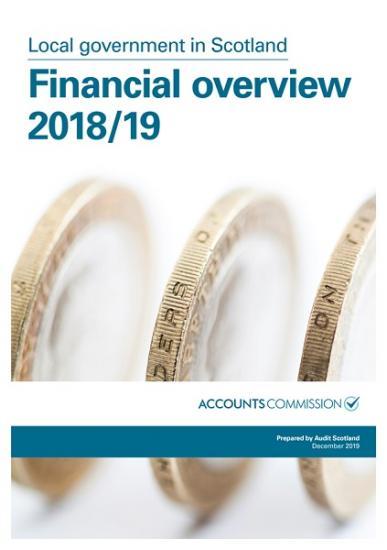Worrying Trends As Scottish Local Authorities Need To Make More Cuts and Increase Charges
17th December 2019

Audit Scotland today (17 December 2019) has published its report on Scottish Councils funding highlighting the problems of ever decreasing budgets. Despite the last few years of redesign and cuts more is necessary unless Scottish Government increases funding. In real terms funding to councils from Scottish Government has reduced faster than the reduction to Scottish Government from Westminster.
Most of Scotland's 32 councils are increasingly relying on money from reserves to keep up with demand for services and balance their budgets.
The report today from the Accounts Commission, Scotland's national watchdog for local government, says the financial pressures are likely to get worse. Demand for services continues to grow, funding for councils from the Scottish Government has reduced by 7.6 per cent since 2013/14 and is forecast to reduce further.
The report, Local Government in Scotland, also says Integration Joint Boards are struggling to balance their budgets; in 2018/19, 19 of Scotland's 30 IJBs needed additional funding, or recorded deficits.
Graham Sharp, chair of the Accounts Commission, said:"We urgently need much faster progress in the reform of our health and social care services. The current position is increasingly unsustainable.
"There's a need for councils to continue rethinking how they deliver services, as well as look at ways to increase their income. For some councils in Scotland, finding ways to do this is getting more and more difficult as their current income doesn't match demand."
Key facts
0.7 per cent - Real terms reduction in Scottish Government revenue funding 2017/18 to 2018/19
£17.7 billion - Councils' income 2018/19
£2.75 billion - Councils' capital spending in 2018/19
£2.5 billion - Councils' usable reserves at 31 March 2019
£9.3 billion - Councils' share of the Local Government Pension Scheme deficit at 31 March 2019
£15.4 billion - Councils' net debt at 31 March 2019
£2.5 billion - Council budgets delegated to IJBs in 2018/19
£8.6 billion - IJBs' spending in 2018/19
Key messages
Councils:
1. In 2018/19, Scottish council revenue income totalled £17.7 billion, an increase from 2017/18 (£17.3 billion).
2. Scottish Government revenue funding remains the most significant source of income and this increased by 1.1 per cent in cash terms in 2018/19, a 0.7 per cent decrease in real terms. Since 2013/14, Scottish Government funding to councils has reduced by 7.6 per cent in real terms.
3. In 2018/19, the funding gap was three per cent of total budget. Councils planned to manage this primarily through savings, though a shortfall in savings achieved meant that more of the funding gap was met from reserves than planned.
4. Councils are increasingly drawing on their revenue reserves. The net draw on revenue reserves in 2018/19 was £45 million. Twenty-three councils have reduced their general fund reserves over the last three years.
5. Capital expenditure increased by £62 million (2.3 per cent) to £2.75 billion, with more spent on housing and less on education.
6. All councils have medium-term financial planning covering three years or more. Long-term financial planning has not improved since last year and more progress is needed.
7. Councils have made preparations for EU withdrawal but there are many potential implications that cannot be anticipated in financial planning.
Integration Joint Boards (IJBs):
8. A majority of IJBs struggled to achieve break-even in 2018/19, either recording a deficit or relying on additional funding from partners.
9. Around a third of the IJBs failed to agree a budget with their partners for the start of the 2019/20 financial year.
10. Medium-term financial planning is improving but no IJB had a financial plan that extended for more than five years. A focus on developing longer-term financial planning is required by IJBs.
11. Over a third of IJB senior staff have changed during 2018/19.
Fees, charges and local taxation
Many councils have been increasing fees and some have introduced new charges
79. Charges for services vary across councils. For example, some councils do not charge for music instruction but the majority have an annual charge. This varies significantly from £117 in Inverclyde Council to £524 in Clackmannanshire Council.
80. Many councils are increasing charges for services. An analysis of 18 types of charges indicates that two of the largest increases from 2018/19 to 2019/20 were applied to:
Community alarms, 22 councils provided information on this charge and the average increase was 19 per cent.
Bulky waste uplift, where 27 councils reported an average increase of eight per cent.
81. Some councils continue to introduce new fees and charges. These include:
garden waste uplift
the expansion of parking charges
new charges associated with funerals (for example, use of multi-media)
licensing (for example, new licences for public entertainment)
planning services (for example, pre-application meeting charges).
Greater council tax increases were deployed in 2019/20 than in previous years
82. In 2019/20, the Scottish Government increased the cap on council tax increases to 4.8 per cent in cash terms (3.0 per cent in real terms). Twelve councils decided to increase council tax by the full amount (4.8 per cent). Thirteen councils increased it by three per cent and the other seven by between 3.9 and 4.5 per cent.
Councils continue to pursue new local taxes
83. As we reported in our report Local government in Scotland: Challenges and Performance 2019 , local authorities are exploring new ways in which to raise tax locally.
84. The City of Edinburgh Council has endorsed a proposal for an Edinburgh transient visitor levy or ‘tourist tax'. This would be based on a charge of £2 per room per night applying all year round for all accommodation types within the council boundary, except for campsites, for a maximum of seven consecutive nights. This scheme is expected to raise up to £14.6 million a year. Implementation of this will require legislation to be passed by the Scottish Parliament. The government has included a Transient Visitor Levy Bill in their 2019/20 programme for Scotland (Protecting Scotland's Future: the Government's Programme for Scotland 2019-2020). The Bill aims to provide local authorities with discretionary powers to apply the charge with the income being used to fund local authority expenditure on tourism.
85. In October 2019, the Transport Act was passed. The Scottish Government supported amendments to the Bill at stage two of the legislative process, which provide local authorities with the discretionary power to apply a workplace parking levy.
EU withdrawal
86. EU withdrawal has the potential to exacerbate the existing financial pressures faced by councils. The risk of increased cost of goods and services from the EU is one of the more immediate concerns. Longer term, councils are concerned about the wider economic implications for public finances and the impact on their local areas. For example, increases in interest rates, reduction in business investment or an increase in unemployment and poverty are all risks to councils’ communities and therefore to councils’ financial planning.
In December 2019, we plan to publish a briefing on how the public sector in Scotland has responded to EU withdrawal. This will be available on the Audit Scotland website .
87. The Scottish Government has allocated £1.6 million (£50k per council) to support ongoing work in councils to coordinate preparations for leaving the EU. It has also approved £7 million for a Rapid Poverty Mitigation Fund, to enable councils to respond to anticipated increased demand in the event of a no-deal exit. This includes scaling-up existing measures such as the Scottish Welfare Fund and Discretionary Housing Payments and supporting people in food or fuel poverty.
Read the full report HERE
A Scrutiny Tool For Councillors
Highland council have for the last few years been tackling the problems of reducing budgets by redesigning services and tis process is ongoing. To see some of what is happening from Redesign of services you can read the minutes of the Redesign group at https://www.highland.gov.uk/info/20003/committee_information/696/redesign_of_the_highland_council_board
Related Businesses
Related Articles
Exciting Career Opportunities With The Highland Council Now Open For Applications
# 10 December 2025 Career opportunities with The Highland Council The Highland Council is looking to fill a variety of posts relating to civil engineering and flood risk management based in locations across the area. Included are opportunities specifically for civil engineering graduates and technicians, providing the ideal job with career progression for anyone recently qualified and ready for a varied and interesting role.
What the NC500 Research Projects Are Designed to Do - and Why They Matter for the Highlands
As the North Coast 500 approaches its tenth anniversary, it has become one of Scotland's most well-known tourism success stories. The 516-mile loop around the far north of the Highlands has been celebrated internationally, marketed as a world-class road trip, and credited with transforming visitor numbers in some of Scotland’s most remote areas.Help Shape the Future of Thurso
The Highland Council is inviting people that live, work, or study in Thurso, to come along to the public consultation events to have their say. This is an opportunity to help shape the future of Thurso, to gather views and ideas.
Are Scottish Councils Quietly Reversing Outsourcing? A Look at Insourcing, Cuts and the Highland IT Shift
A notable article in the Guardian on 6 December 2025 noted the high sums being paid by London councils outsourcing services to private firms. The article starts with the reduction in council funding by UK government since 2010.Council welcomes Visitor Levy flexibility plan
The Highland Council welcomes moves by the Scottish Government to introduce greater flexibility on how it could design a Visitor Levy Scheme for consultation. The Visitor Levy (Scotland) Act 2024 currently provides local authorities with discretionary powers to implement percentage-based levies following statutory consultation.Highland Council is reaching out for views to shape its next 26/27 budget.
As it looks to set out its forthcoming priorities, the council is seeking involvement from members of the public, including businesses, community groups, parents, and young people. All their opinions are going to be crucial in deciding how Highland Council will take on its budget challenge for 2026-2027.Have your say in Thurso's future £100million investment by attending public consultation events
Thurso is to benefit from £100m investment in education and community facilities and are rolling out the first phase of public consultations on 9 and 10 December 2025. The Highland Council is inviting people that live, work, or study in Thurso, to come along to the public consultation events to have their say; this is an opportunity to help shape the future of Thurso, to gather views and ideas.Finding new owners for empty homes - Scheme launched to help return more empty homes to active use
A new online portal has been launched to bring empty homeowners together with prospective buyers or developers with the aim of facilitating more properties to be used as homes again. Covering the whole of Scotland, this builds on the success of local pilots, referred to as "matchmaker schemes".Consideration for short term let control area in Skye and Raasay
Steps towards introducing a short term let control area have been considered by Highland Council's Isle of Skye and Raasay area committee. On Monday (1 December 2025) the committee heard evidence to justify the grounds for the introduction of a Short Term Let Control Area covering all or part of Skye and Raasay.Workforce North event spotlights Highland economy
EMPLOYERS and educators from across the Highlands have gathered to hear how a new initiative is aiming to transform the region's economy. Workforce North - A Call to Action brought together business leaders and teachers from primary and secondary schools from across the Highland Council area with a wide range of partners geared towards education, learning and skills development at Strathpeffer Pavillion.
